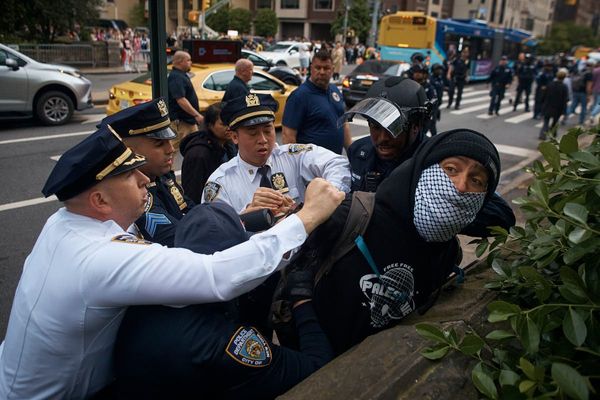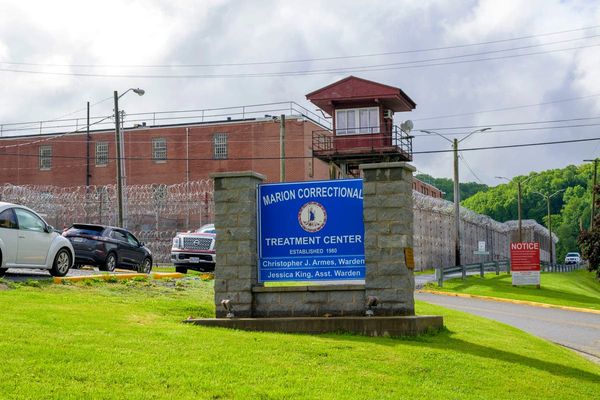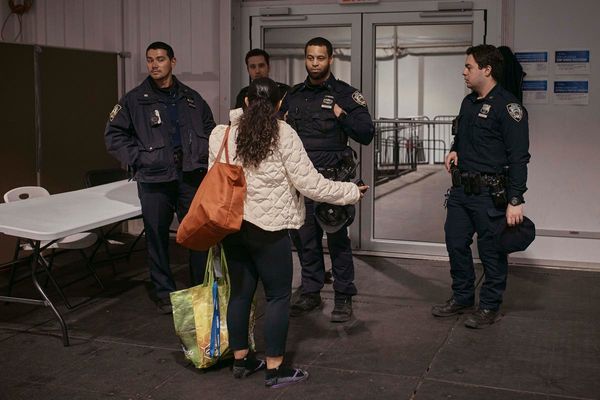BALTIMORE — Monthslong debates on the future of gun control and the creation of a recreational cannabis industry in Maryland mostly came to an end Saturday as lawmakers convened in Annapolis ahead of the session’s final day Monday.
In a rare weekend gathering, House lawmakers gave final approval to bills addressing both issues — limiting who can carry guns and where, and how the framework for a potentially multibillion-dollar cannabis industry gets off the ground this summer.
The moves followed a marathon session in the Senate late Friday that saw that chamber pass many of the same bills. A couple need a few more formal votes before heading to Democratic Gov. Wes Moore’s desk.
The annual 90-day legislative session is scheduled to conclude Monday night, ending the first lawmaking period in eight years with Democrats firmly in control of the legislature and the governor’s office.
Guns and cannabis had been two of the largest and most complicated issues before the General Assembly after last year’s U.S. Supreme Court decision overturning a longtime “concealed carry” law and a state ballot referendum that approved recreational cannabis beginning July 1.
The Senate passed House Judiciary Committee Chair Luke Clippinger’s firearm regulation bill late Friday evening. The House chamber passed it Saturday afternoon with four floor amendments and no debate.
If signed by Moore, House Bill 824 would limit who gets a license to carry a concealed gun. The bill was amended in the Senate Judicial Proceedings Committee to increase the criminal penalty for people illegally carrying a gun from three to five years — on par with legislation Baltimore State’s Attorney Ivan Bates lobbied for earlier this year.
Democratic Sen. Jill P. Carter offered an amendment Friday evening to Clippinger’s bill to let people who have completed sentences for illegal firearm possession enroll in the classroom component of a gun safety and training course. Such sessions don’t involve actually handling firearms.
“Increasing penalties, alone, teaches no one anything,” Carter said Friday evening. “It might get them off the street for a minute, but they’re coming right back on the street after the sentence and they have learned absolutely nothing. But we need to rehabilitate people, and we need to teach them how to operate responsibly.”
Senate Judicial Proceedings Committee Chair Will Smith of Montgomery County said he liked the concept, but “in this eleventh hour” of the legislative session thought it was too late to push forward with it.
“We’re lawmakers, and it’s our responsibility that when we make laws to make the best laws that we can possibly make,” Carter responded. “It’s one thing to have enhanced penalties or a ‘tough-on-crime’ strategy, but if we’re doing nothing, whatsoever, to try to give those people an opportunity down the road to do everything right to overcome that criminality — to overcome that criminal conviction?”
At first, the amendment was accepted by the Senate on a vote of 27-16. But to the dismay of Carter, Republicans and a small handful of Democrats, it was brought back to the floor for consideration around 11 p.m. and stripped away.
“All we hear from people in this body and in the media and all across this state is about ‘guns, guns, guns,’ ‘firearms, firearms, firearms,’ and we’re responsible for making the best policy,” Carter said. " ... We are supposed to make balanced, good policy, and that’s what this amendment did, and so I do not appreciate the lengths that are being taken to destroy it.”
Smith reiterated that he thought it was good policy, but that it was too far in the session to meaningfully discuss it and add it to the bill, which passed out of the Senate on a 28-13 vote Friday and was given final approval in the House chamber 98-40 Saturday afternoon.
The House also gave final approval to Jaelynn’s Law, or House Bill 307, which would require that gun owners store firearms where children and other people who shouldn’t have guns cannot get to them, and Senate Bill 1, which would prohibit people with concealed-carry licenses from wearing their firearms in certain locations, like polling places and certain health care facilities.
Senate Bill 1 is expected to receive final approval Monday in the House.
The cannabis industry, meanwhile, is expected to get up and running this summer after lawmakers announced an agreement Friday and then quickly passed a robust licensing and regulatory plan.
The major elements of the plan are the same as lawmakers introduced earlier this year.
Medical marijuana businesses would begin converting their licenses to new medical and recreational cannabis licenses before July 1.
That would be followed by a first round of new licenses for “social equity applicants” — those who have lived in or attended school in an area “disproportionally impacted” by cannabis criminalization — by Jan. 1. There would then be a second round of licenses after May 1, 2024 for any other applicants. Large portions of the revenue from a 9% sales tax on recreational cannabis would go toward communities disproportionally affected by the war on drugs.
During the House session Saturday, delegates voted 104-35 to give the House version (House Bill 556) of the cannabis bill final approval and preliminary approval to the identical Senate bill (Senate Bill 516). The Senate version needs one final vote in both chambers Monday.
“The cake is baked on this,” Del. Kathy Szeliga, a Baltimore County Republican said during the floor debate. “Maybe I should say the brownie is baked on this.”
Szeliga was one of several GOP members who spoke out against the bills and ultimately voted against them because of various provisions in the licensing process, the expected outlawing of many hemp-derived products and new zoning requirements for dispensaries.
Amendments addressing some of those ideas failed, including one from Del. Wayne Hartman, a Republican. He sought to extend from 500 feet to 1 mile the proposed distance from a dispensary to schools, playground, libraries, parks, and recreation centers.
Del. C.T. Wilson, a Democrat who has led the cannabis legalization effort in the House, said that extended boundary would limit access “to almost nowhere in Maryland.” For example, he said, it would preclude any dispensaries from operating in Ocean City, in Hartman’s district.
Wilson said one of the primary goals of legalization is to make cannabis safe by eliminating the black market. Severely limiting locations for dispensaries would mean less accessibility.
Newly established dispensaries must also be at least 1,000 feet from another dispensary, according to the bill.
The floor discussion at one point also turned to the legislation’s proposed restrictions on advertising cannabis. It would bar imagery targeting minors or any display of smoking or otherwise consuming cannabis.
“We don’t want to advertise to children. We don’t want SpongeBob with a joint in his mouth,” Wilson said. “You can advertise, but you can’t be reckless.”
Scores of other bills advanced through the House before lawmakers adjourned for Easter Sunday, with a plan to return Monday for a long final day.
Others that are officially headed to Moore’s desk after the Friday and Saturday sessions include Senate Bill 379 and House Bill 535, identical bills that would give local election workers more time to process mail-in ballots, let voters fix or “cure” their ballots via text message, and push the 2024 primary election from April to May to avoid overlapping with Passover.
One that received preliminary approval in the chamber was Senate Bill 720, a last-minute agreement to create a new governing body overseeing racetracks — including the troubled redevelopment of Pimlico Race Course in Baltimore and Laurel Park. The progress on those projects has stalled after lawmakers approved plan to fund and carry them out in 2020.
The Maryland Thoroughbred Racetrack Operating Authority would be responsible for studying and developing all horse racing facilities. It would have to report to the General Assembly by Dec. 1 on the feasibility of establishing at least two alternative thoroughbred training facilities in the state and on the progress of the Pimlico and Laurel redevelopment, according to the bill, which could see final passage Monday.
Senate President Bill Ferguson, a Democrat, said Wednesday the plan for the authority would hopefully “bolster up the thoroughbred racing industry,” but it’s unclear if there will be resolutions to the projects.
“We’re in a very precarious moment, and I don’t know what the end is,” Ferguson said. “I do think that this bill provides an authority that can be the backstop to negotiate moving forward.”







